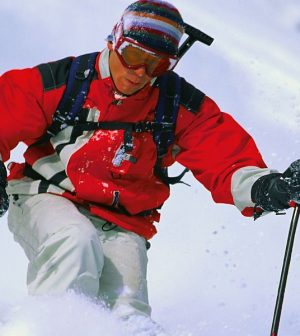- 10 Strategies to Overcome Insomnia
- Could Artificial Sweeteners Be Aging the Brain Faster?
- Techniques for Soothing Your Nervous System
- Does the Water in Your House Smell Funny? Here’s Why
- Can a Daily Dose of Apple Cider Vinegar Actually Aid Weight Loss?
- 6 Health Beverages That Can Actually Spike Your Blood Sugar
- Treatment Options for Social Anxiety Disorder
- Understanding the Connection Between Anxiety and Depression
- How Daily Prunes Can Influence Cholesterol and Inflammation
- When to Take B12 for Better Absorption and Energy
High-Altitude Exercise Could Bring Danger to People With Type 1 Diabetes

Hiking and skiing in the mountains may wreak havoc on the blood sugar levels of those with type 1 diabetes, new research suggests.
Exercise offers many benefits — such as improved heart health, better insulin sensitivity and quality of life — for people with diabetes and is often recommended by their doctors.
However, it can also trigger hypoglycemia — low blood sugar — in people with diabetes during and after a workout.
“These findings suggest that exercise performed shortly after exposure to high altitude may increase the risk of exercise-mediated hypoglycemia,” said study author Cory Dugan, from the University of Western Australia.
A severe drop in blood sugar requires quick action because there’s a risk that the person will suffer seizures, become unconscious or die.
To assess how exercise at high altitudes affects blood sugar in people with diabetes, researchers measured blood sugar levels in seven people with type 1 diabetes before and after they did two indoor cycling sessions that mimicked conditions at sea level and at high altitude.
After one hour of exercise at a simulated altitude of 4,200 meters (about half the height of Mount Everest) and during recovery, the participants’ blood sugar levels were significantly lower.
The findings were published in the Journal of Clinical Endocrinology & Metabolism and show that people with diabetes may need to closely monitor their blood sugar when doing high-altitude activities.
“We ask that future guidelines consider these findings to increase the safety of people with type 1 diabetes when traveling from low- to high-altitude areas like the mountains without any acclimatization,” Dugan said in a journal news release.
More information
The American Academy of Family Physicians has more on blood sugar monitoring.
SOURCE: Journal of Clinical Endocrinology & Metabolism, news release, Dec. 22, 2021
Source: HealthDay
Copyright © 2026 HealthDay. All rights reserved.










